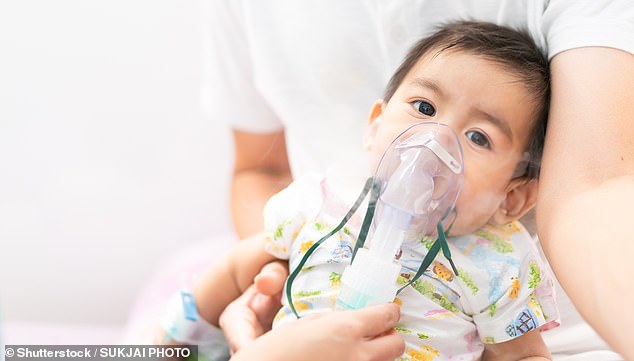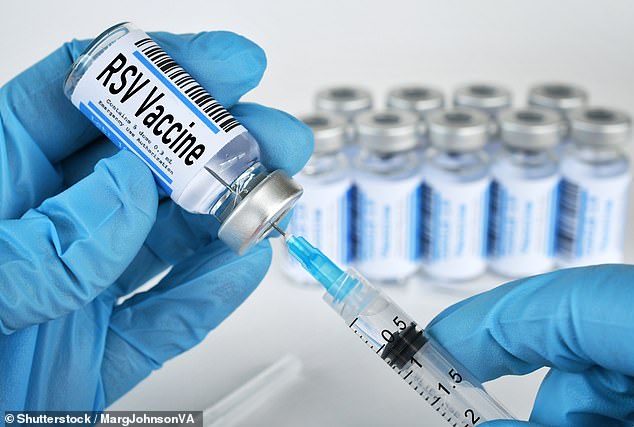Should You Get the New RSV Vaccination? The virus is just as risky as the flu and experts are calling for a national vaccination program for people over 75
Few of us may have heard of this virus, but now leading scientists are warning that RSV (respiratory syncytial virus) poses a significant threat to the health of some people.
Until now, RSV, a common winter disease, has mainly been associated with young children.
Almost all children will have it by the time they turn two, and for many it is mistaken for a cold. However, in some babies it can cause inflammation of the small airways and significant breathing difficulties, and in children under five it causes 20 to 30 deaths per year.
But according to British scientists, another group of patients is also at risk from the virus. RSV is increasingly found to cause serious and sometimes fatal respiratory disease in the elderly, especially those with heart or lung problems or those who are physically frail.
It is estimated to be responsible for more than 29,000 hospital admissions of people over 65 in Britain every year. The majority, 70 percent, are adults over 75 years old.
Harish Nair, professor of childhood diseases and global health at the University of Edinburgh, says some mathematical studies even estimate that RSV could cause the same annual increase in hospital admissions and deaths in Britain as flu.
Experts recommend that 5.5 million over-75s in Britain should be vaccinated against RSV as part of a national vaccination campaign
Yet the viral infection is underdiagnosed and undertreated, not least because its symptoms are not fully recognized and can be mistaken for a cold, flu or even neurological conditions.
Such is the concern that the Joint Committee on Vaccination and Immunization (JCVI), an independent expert committee that advises the government on vaccine jabs, is recommending that 5.5 million over-75s in Britain should be vaccinated against RSV as part of a national vaccination campaign. , using newly developed jabs.
Sir Andrew Pollard, chairman of the JCVI and professor of infection and immunity at the University of Oxford, told Good Health that the risk of repeat RSV infections increases with age and can worsen chronic conditions.
“In adulthood, we get a ‘cold’ every three or four years, which is actually RSV,” he explains. ‘And as we get older, we are more likely to develop other conditions that make us more vulnerable to RSV.
‘As we reach the age of 65, an increasing proportion of the population has medical conditions that can be exacerbated by an RSV infection.
‘If you have heart failure and get a respiratory infection, the symptoms of heart failure become much worse. The same applies to people with chronic lung disease.’
Normally the RSV season in the UK starts in October, peaking in December and falling in March. The majority of infected people have only mild illness and usually show symptoms within four to six days of becoming infected: a runny nose, loss of appetite, coughing, sneezing, wheezing and fever.
But some estimate it could cause as many hospitalizations and deaths annually as the flu because it can cause life-threatening symptoms in people who are frail or vulnerable, especially the elderly.
A 2012 study by the UK Health Protection Agency concluded that the virus causes 1,200 deaths per year among people aged 45 to 74 in England and Wales alone, and 4,000 deaths among the over-75s.
But the JCVI says these figures may be an underestimate – and better monitoring is needed.
Professor Nair told Good Health that these figures may be at least 250 percent too low.
Normally the NHS diagnoses RSV using samples of nasal mucus. But Professor Nair says that, thanks to the fact that immune defenses decline with age, ‘older people shed very little RSV in their nasal mucus – so their results are often negative. You should test their pulmonary sputum (mucus samples from the lung) and their spit.
‘If you combine nasal mucus, lung sputum and spit tests, you get at least two and a half times more positive results. If you also test people’s blood, you should get even more positive results.’
Another reason why so many RSV infections are missed, he says, is because “we still don’t understand the full range of symptoms.”
As he explains, even though RSV is known as a respiratory infection, it can affect older people in other, much less obvious ways.

In some babies it can cause inflammation of the small airways and significant breathing difficulties, and it causes 20 to 30 deaths per year in children under five.

If you are older and worried about contracting RSV, those aged 60 and over can get the GSK vaccine privately from pharmacies at a cost of around £180 to £200 per injection.
‘They may end up in hospital with confusion, lethargy and falls. They are tested for neurological problems, but in reality their problems are caused by an RSV infection.”
This is because the infection can cause weakness in older people, increasing the risk of falls; it can also cause a fever, which can make them confused.
“Only after we implement the vaccination program will we understand the true burden of this infection, by comparing hospitalizations and deaths before and after the introduction of the program,” said Professor Nair.
Another reason RSV cases are undercounted is that until now there has been no preventive treatment, says Christopher Chiu, professor of infectious diseases at Imperial College London, so testing for it was not considered important.
Ministers are now considering the JCVI’s recommendation for a national vaccination campaign for the over-75s.
This follows the launch last year of RSV vaccines – the first to be developed against the virus – by GSK and Pfizer.
GSK’s vaccine, Arexvy, was approved for use in older adults by the Medicines and Healthcare products Regulatory Agency in July. Pfizer’s shot, Abrysvo, was approved at the end of November.
The JCVI says both jabs can be used in a vaccination campaign because their effectiveness is ‘broadly similar’. (The new shots are effective for at least two years.)
‘I think we will be quite surprised by the rate of RSV infections in older adults,’ says Professor Pollard.
‘The virus is really brutal. It has ways of disabling our immune systems so we never get full immunity to it.”
He believes a vaccination campaign will prove very cost-effective if it helps keep the elderly out of hospitals in winter.
“The NHS is facing enormous winter pressures caused by the seasonal increase in respiratory viruses,” he said. ‘As well as flu, other respiratory infections cause older and vulnerable people to be admitted to hospital – and RSV is at the top of the list.’
To older people worried about the prospect of another jab on top of Covid, flu and shingles, Professor Pollard says: ‘There is no concern about over-vaccinating older immune systems. Our immune defenses are attacked daily by viruses and bacteria. The RSV vaccine provides an extremely trivial dose in comparison.” He is also reassuring about possible side effects: headache, injection site pain, fatigue, and joint or muscle aches or pains.
“Regulators have no concerns about the evidence from the trial and there is very robust safety monitoring,” he says.
Dr. Mary Ramsay, director of immunization at the UK’s Health Security Agency, told Good Health: ‘We fully support the introduction of RSV vaccination as a routine NHS programme, following the recommendations of the JCVI and provided the vaccine is cost-effective is. ‘
A Department of Health and Social Care spokesperson added: ‘We are developing plans to deliver RSV programs for babies and adults.’
In the meantime, if you are older and worried about contracting RSV, those aged 60 and over can get the GSK vaccine privately from pharmacies at a cost of around £180 to £200 per jab.
Professor Chiu advises: ‘If you are between 65 and 75 and in good health, without lung or heart problems, then this is not critical. But you should consider getting vaccinated if you are in that age range and have heart or chest problems related to smoking, or if you have asthma or chronic lung diseases.
‘If you’re 75 or over, it makes sense to get vaccinated no matter how healthy you are – although you may want to wait until you get it for free on the NHS.’
